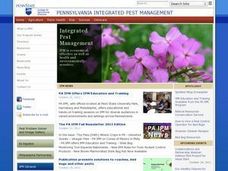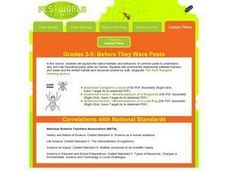Curated OER
Mouthpart Madness
Learners explore the basic biology of a pest. They identify the four major kinds of insect mouthparts and explain how they work. Students examine the specific mouthparts and how they can limit food resources and in what environment an...
Curated OER
Arthropod Key
Students identify the types of pests and categorize them. They identify their food chain and create a poster showing the food chain for the pests.
Curated OER
Bats -- Pests or Pals?
Fourth graders examine a bat and determine if it is a pest or pal. They identify three types of bats native to the state of Pennsylvania. They also identify the parts of a bat and write a report on the bat of their choice.
Curated OER
What's A Pest?
Students examine the common characteristics of household and lawn pests. They discover the life cycles of the pests. They also learn different ways to control the pests.
Curated OER
Invasion of the Habitat Snatchers!
Fourth graders investigate invasive plants found in a park or school environment and acknowledge the problems caused by the plants. They describe 4 methods of control of invasive plants.
Curated OER
Red Means Danger
Students describe some common pests. They study three levels of pest control from the IPM pyramid.
Curated OER
Duck, Duck, GOOSE!
Students examine the migratory cycle of Canada geese, and explore the reasons that some birds have stopped migrating and become residents of an area. They identify the ways which geese are considered pests and explore ways to control...
Curated OER
Termitology
Students engage in an inquiry-based study of the ecology of termites. Through hands-on investigations, they explore the life cycle of termites, the termite's role in the food web, and the unique social structure of termite colonies.
Curated OER
Before They Were Pests
Learners explore the native habitats and behaviors of common pests to explain why and how household pests enter our homes. Theyexamine the relationship between humans and pests and the limited habitat and resources shared by both.
Curated OER
Household Pests
Students participate in an experiment to show how germs are spread, by food, fingers and feces. They conduct a bacteria count using a colony counter.
Curated OER
Crickets on the Hearth
Middle schoolers investigate how crickets behave in cold temperatures. In this life science lesson, students explain the beneficial and harmful effect of pests. They research ways to properly manage them.
Curated OER
What is a Pest?
Students investigate whether rabbits should be considered pests even though they make good pets. They extend this to determine what, when, and where other organisms are considered to be pests, and examine why the concept of a pest is a...
Curated OER
Integrated Pest Management
Students compare and contrast the role of the honeybee in nature. They find information by using a variety of resources that could include the internet. Students take part in a paper and pencil formal evaluation with questions that...
Curated OER
Introduction To Pests
Students investigate common pests and match pests to their respective pictures. In a group discussion, students explore the basic needs of pests and share personal pest stories. They examine common self-protection measures. Using the...
Curated OER
When Is a Pest an Insect?
Students view the importance of insects as pollinators. They are now posed with the problem--those insects are nice--but insects are pests right? Students explore their description of pests and pesticides.
Curated OER
Integrated Pest Management-You're Buggin' Me
Students research certain crops and how farmers protect them, while other students research certain insects and how they attack the crop. Each group then documents a ten season plan and then insect and farmers give an attack and...
University of California
Universtiy of Cal/uc Ipm Online
Everything you want to know about IPM.How to manage pest and various links to more important info.
Other
National Pest Management Association: The Univited Houseguest
An ebook called The Pest Detectives: The Univited Houseguest, written by Jo-Lynne Shane. The story is about a family discovering that they have been invaded by mice. They call a pest control professional. He arrives with his daughter to...
Ed Koday
Web Archive: Box Elder Bug
This bug is about 1/2 inch long and 1/3 as wide. It is black with three red lines on the thorax, a red line along each side, and a red line on each wing. The wings lie flat on the back when at rest. The young nymphs are red and gray. The...
TED Talks
Ted: Ted Ed: Do We Really Need Pesticides?
Annually, we shower over 5 billion pounds of pesticides across the Earth to control insects, unwanted weeds, funguses, rodents, and bacteria that may threaten our food supply. But is it worth it, knowing what we do about the associated...
Other
Association of Natural Bio Control Producers
This site is all about integrated pest management. Here you can learn about beneficial producers and consumers.
Libre Text
Uc Pest Management Guidelines: Small Grains: Mites
A site on the grain mite and the damage it causes to produce.
National Pest Managment Association
Pest World for Kids: Termitology
An inquiry based lesson plan that delves into termite biology, distribution and habitat, life cycle, social structure, and the role of termites in nature and the food chain.























